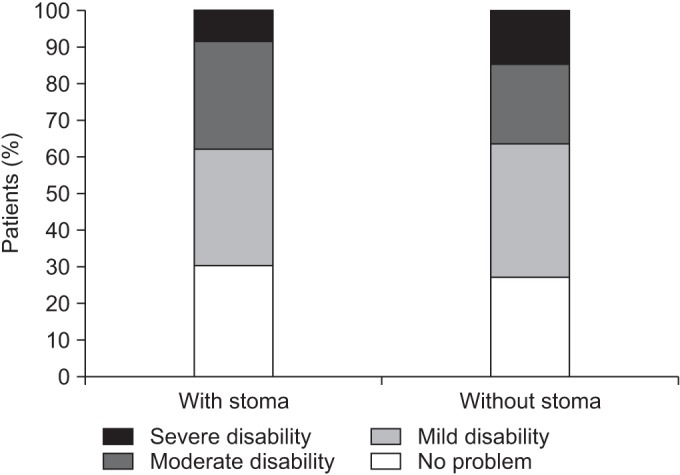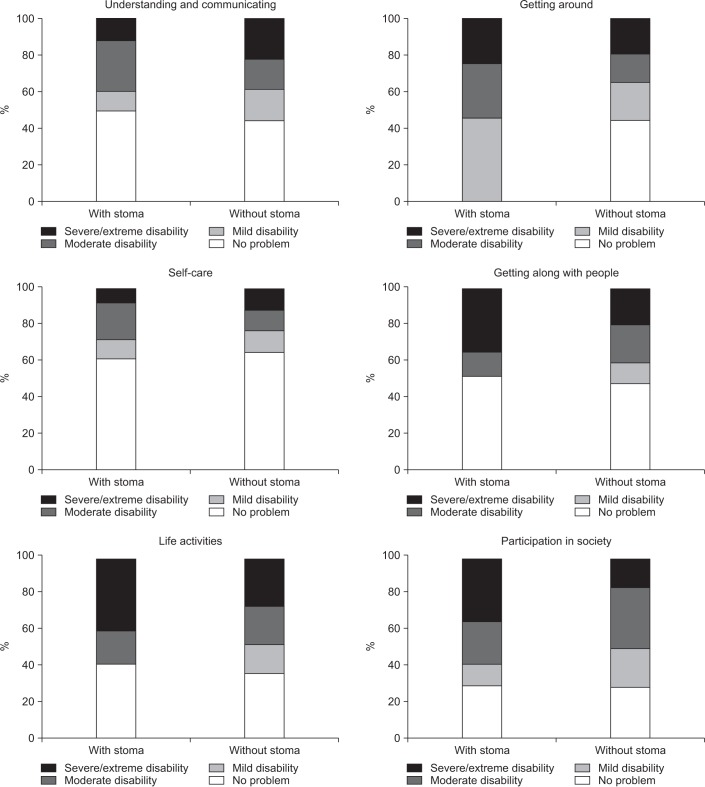Ann Rehabil Med.
2017 Aug;41(4):667-676. 10.5535/arm.2017.41.4.667.
Is WHODAS 2.0 Useful for Colorectal Cancer Survivors?
- Affiliations
-
- 1Department of Rehabilitation Medicine, Seoul National University Hospital, Seoul, Korea.
- 2Department of Social Welfare, Dankook University, Yongin, Korea.
- 3Department of Rehabilitation Medicine, Bundang Seoul University Hospital, Seongnam, Korea. graceloves@gmail.com
- KMID: 2389413
- DOI: http://doi.org/10.5535/arm.2017.41.4.667
Abstract
OBJECTIVE
To compare the disability level of colorectal cancer survivors with and without stoma by using the Korean version of the 12-item, interview-administered World Health Organization Disability Assessment Schedule 2.0 (Korean version of WHODAS 2.0).
METHODS
This is a multicenter (five tertiary university hospitals and the Korea Ostomy Association) and cross-sectional survey. Colorectal cancer survivors with and without stoma were interviewed. Survey measured disability level using the Korean version of WHODAS 2.0 and health-related quality of life using the SF-36.
RESULTS
A significant difference was observed between patients with and without a stoma in two subdomains: getting around (31.1 vs. 20.3; p=0.013) and participation in society (32.3 vs. 22.2; p=0.028). After adjusting for age, gender, and time since surgery, having a stoma was associated with severe to extreme disabilities in participation (OR=2.72, p=0.045). The Korean version of WHODAS 2.0 showed satisfactory internal consistency (r=0.96) and convergent validity.
CONCLUSION
Patients with stoma participated less in society than those without stoma. The Korean version of WHODAS 2.0 is a reliable and valid instrument for measuring disability in Korean colorectal cancer patients.
Keyword
MeSH Terms
Figure
Reference
-
1. Adderson EE, Boudreaux JW, Cummings JR, Pounds S, Wilson DA, Procop GW, et al. Identification of clinical coryneform bacterial isolates: comparison of biochemical methods and sequence analysis of 16S rRNA and rpoB genes. J Clin Microbiol. 2008; 46:921–927. PMID: 18160450.2. Royse CF, Newman S, Chung F, Stygall J, McKay RE, Boldt J, et al. Development and feasibility of a scale to assess postoperative recovery: the post-operative quality recovery scale. Anesthesiology. 2010; 113:892–905. PMID: 20601860.3. Wilson TR, Alexander DJ. Clinical and non-clinical factors influencing postoperative health-related quality of life in patients with colorectal cancer. Br J Surg. 2008; 95:1408–1415. PMID: 18844250.
Article4. Engel J, Kerr J, Schlesinger-Raab A, Eckel R, Sauer H, Holzel D. Quality of life in rectal cancer patients: a four-year prospective study. Ann Surg. 2003; 238:203–213. PMID: 12894013.5. Hohenberger W, Merkel S, Matzel K, Bittorf B, Papadopoulos T, Gohl J. The influence of abdomino-peranal (intersphincteric) resection of lower third rectal carcinoma on the rates of sphincter preservation and locoregional recurrence. Colorectal Dis. 2006; 8:23–33. PMID: 16519634.
Article6. Dumont F, Ayadi M, Goere D, Honore C, Elias D. Comparison of fecal continence and quality of life between intersphincteric resection and abdominoperineal resection plus perineal colostomy for ultra-low rectal cancer. J Surg Oncol. 2013; 108:225–229. PMID: 23868337.
Article7. Pachler J, Wille-Jorgensen P. Quality of life after rectal resection for cancer, with or without permanent colostomy. Cochrane Database Syst Rev. 2012; 12:CD004323. PMID: 23235607.
Article8. Ustun TB, Chatterji S, Kostanjsek N, Rehm J, Kennedy C, Epping-Jordan J, et al. Developing the World Health Organization Disability Assessment Schedule 2.0. Bull World Health Organ. 2010; 88:815–823. PMID: 21076562.9. Sousa RM, Dewey ME, Acosta D, Jotheeswaran AT, Castro-Costa E, Ferri CP, et al. Measuring disability across cultures: the psychometric properties of the WHODAS II in older people from seven low- and middle-income countries. The 10/66 Dementia Research Group population-based survey. Int J Methods Psychiatr Res. 2010; 19:1–17.10. Von Korff M, Crane PK, Alonso J, Vilagut G, Angermeyer MC, Bruffaerts R, et al. Modified WHODAS-II provides valid measure of global disability but filter items increased skewness. J Clin Epidemiol. 2008; 61:1132–1143. PMID: 18619808.
Article11. Luciano JV, Ayuso-Mateos JL, Fernandez A, Serrano-Blanco A, Roca M, Haro JM. Psychometric properties of the twelve item World Health Organization Disability Assessment Schedule II (WHO-DAS II) in Spanish primary care patients with a first major depressive episode. J Affect Disord. 2010; 121:52–58. PMID: 19464735.
Article12. Zhao HP, Liu Y, Li HL, Ma L, Zhang YJ, Wang J. Activity limitation and participation restrictions of breast cancer patients receiving chemotherapy: psychometric properties and validation of the Chinese version of the WHODAS 2.0. Qual Life Res. 2013; 22:897–906. PMID: 22684528.
Article13. Yoon JS, Kim JM, Shin IS, Yang SJ, Zheng TJ, Lee HY. Development of Korean version of World Health Organization Disability Assessment Schedule II (WHODAS II-K) in community dwelling elders. J Korean Neuropsychiatr Assoc. 2004; 43:86–92.14. World Health Organization. WHO Disability Assessment Schedule 2.0 (WHODAS 2.0) [Internet]. Geneva: World Health Organization;c2017. cited 2017 Jul 1. Available from: http://www.who.int/classifications/icf/whodasii/en/index4.html.15. Prince M, Glozier N, Sousa R, Dewey M. Measuring disability across physical, mental and cognitive disorders. Arlington: American Psychiatric Publishing Inc;2010.16. Han CW, Lee EJ, Iwaya T, Kataoka H, Kohzuki M. Development of the Korean version of Short-Form 36-Item Health Survey: health related QOL of healthy elderly people and elderly patients in Korea. Tohoku J Exp Med. 2004; 203:189–194. PMID: 15240928.
Article17. Portney LG, Watkins MP. Foundations of clinical research: applications to practice. Upper Saddle River: Prentice-Hall;2000.18. Deimling GT, Sterns S, Bowman KF, Kahana B. Functioning and activity participation restrictions among older adult, long-term cancer survivors. Cancer Invest. 2007; 25:106–116. PMID: 17453822.
Article19. Neuman HB, Patil S, Fuzesi S, Wong WD, Weiser MR, Guillem JG, et al. Impact of a temporary stoma on the quality of life of rectal cancer patients undergoing treatment. Ann Surg Oncol. 2011; 18:1397–1403. PMID: 21128000.
Article20. Orsini RG, Thong MS, van de Poll-Franse LV, Slooter GD, Nieuwenhuijzen GA, Rutten HJ, et al. Quality of life of older rectal cancer patients is not impaired by a permanent stoma. Eur J Surg Oncol. 2013; 39:164–170. PMID: 23177350.
Article21. Schmidt CE, Bestmann B, Kuchler T, Longo WE, Rohde V, Kremer B. Gender differences in quality of life of patients with rectal cancer: a five-year prospective study. World J Surg. 2005; 29:1630–1641. PMID: 16311851.
Article22. Sideris L, Zenasni F, Vernerey D, Dauchy S, Lasser P, Pignon JP, et al. Quality of life of patients operated on for low rectal cancer: impact of the type of surgery and patients' characteristics. Dis Colon Rectum. 2005; 48:2180–2191. PMID: 16228842.
Article23. Aaronson N, Alonso J, Burnam A, Lohr KN, Patrick DL, Perrin E, et al. Assessing health status and quality-of-life instruments: attributes and review criteria. Qual Life Res. 2002; 11:193–205. PMID: 12074258.24. Garin O, Ayuso-Mateos JL, Almansa J, Nieto M, Chatterji S, Vilagut G, et al. Validation of the “World Health Organization Disability Assessment Schedule, WHODAS-2” in patients with chronic diseases. Health Qual Life Outcomes. 2010; 8:51. PMID: 20482853.
Article25. Chwastiak LA, Von Korff M. Disability in depression and back pain: evaluation of the World Health Organization Disability Assessment Schedule (WHO DAS II) in a primary care setting. J Clin Epidemiol. 2003; 56:507–514. PMID: 12873644.
- Full Text Links
- Actions
-
Cited
- CITED
-
- Close
- Share
- Similar articles
-
- Exercise Participation Experiences of Colorectal Cancer Survivors
- Factors Influencing Supportive Care Needs of Colorectal Cancer Survivors
- Colorectal Cancer Survivors' Inner Strength, Multiple Identities, and Quality of Life by Gender and Ostomy Presence: A Cross-Sectional Study
- Unmet Needs and Quality of Life of Colorectal Cancer Survivors Immediately after Treatment Ends and 5 Years
- A Literature Review on Unmet Needs of High-Prevalence Cancer Survivors: Focus on Breast Cancer, Thyroid Cancer, Colorectal Cancer, and Lung Cancer



